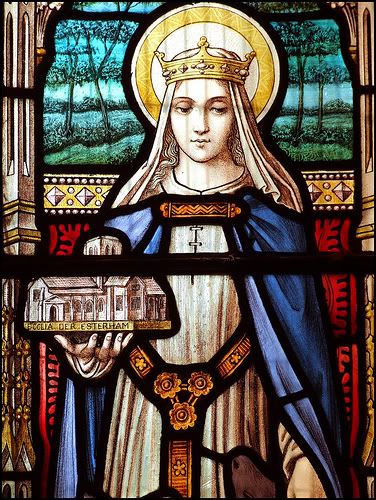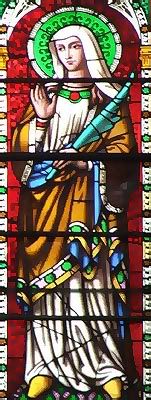Today, July 8, we celebrate the feast of Saint Withburga (died 643), sister of Saint Etheldreda, miracle worker, foundress of the Convent at East Dereham, and Abbess. The simple and obedient life of Saint Withburga inspires us to discern the will of God in our own lives, following His plan to our best ability.
Born the youngest daughter of Anna, King of East Anglia, Withburga grew up in a privileged class, considered a princess. Upon her father’s death, while she was still quite young, Withburga was sent with her nurse to live in a small town near Norfolk called Dereham. There, she grew in piety and love for the Lord, and established a small nunnery with the help of her sister, Etheldreda. She served as Abbess of the fledgling community, which grew considerably under her direction. As the community grew, Withburga eventually began construction of a church.
It is at that point that miracles began to occur, spreading her notoriety and drawing pilgrims to her construction site. As construction of the church continued, money was short. At times, Withburga had little more than bread to feed her workers. One night Our Blessed Mother appeared to Withburga, saying “Send two of your women down to the stream every morning, where two does will stand to be milked.” This she did without question, and the two nuns found the deer waiting, as promised. As a result, there was butter and cheese for all to add to their diet, and the construction progressed with great speed.
Saint Withburga came to be recognized for her great piety, patience, and advice. She was sought out be locals, as well as by leaders from far away. The local official, jealous of the positive attention she was receiving, set off with his hounds to kill the miraculous deer, but was instead thrown from his horse and died of a broken neck. All present reported this as miraculous, which only increased the stream of pilgrims to the area—visiting the stream, the church, and hoping for an audience with Withburga herself.
Saint Withburga died prior to the completion of the church. Pilgrims continued to flock to her graveside, where numerous miracles were reported. Upon exhumation (55 years after her death), her body was discovered to be incorrupt, and moved into a shrine contained within the completed church. Having consecrated herself a virgin while alive, Saint Withburga’s corpse is said to have blushed when one of the men who exhumed the body brushed her check with his finger. Years later, the saint’s relics were stolen from her tomb (by a well-intentioned bishop), and translated to Ely, to be placed next to her sisters. Where her body had been, fresh water sprang forth, and continues to flow freely today. Saint Withburga’s Well has never run dry (despite drought), and some have claimed miraculous healing due to prayer and imbibing of the clear water.
Saint Withburga’s simple faith and obedience allowed her to create an active religious community, offer healing and advice to believers, and feed those who were hungry. Her life is remembered as one of purity and hard work, turning from a privileged life and dedicating herself to the Lord. We look to her for inspiration—just as the pilgrims of her day did-- in making our daily life choices. What advice might Saint Withburga give each of us, were we to ask her today?
Why pray the Rosary every day for a year?
Each time the Blessed Virgin has appeared-- whether it be to Saint Bernadette Soubirous at Lourdes; to Lucia, Jacinta, and Francisco at Fatima; or to Mariette Beco at Banneux-- she has asserted the importance, saving grace, and power of praying the Holy Rosary on a daily basis. Based upon her words, the Rosary is penance and conversion for sinners, a pathway to peace, an end to war, and a powerful act of faith in Jesus Christ. Pope Paul VI presented the Rosary as a powerful means to reach Christ "not merely with Mary but indeed, insofar as this is possible to us, in the same way as Mary, who is certainly the one who thought about Him more than anyone else has ever done."
To show us how this is done, perhaps no one has been more eloquent than the great Cardinal Newman, who wrote: "The great power of the Rosary consists in the fact that it translates the Creed into Prayer. Of course, the Creed is already in a certain sense a prayer and a great act of homage towards God, but the Rosary brings us to meditate again on the great truth of His life and death, and brings this truth close to our hearts. Even Christians, although they know God, usually fear rather than love Him. The strength of the Rosary lies in the particular manner in which it considers these mysteries, since all our thinking about Christ is intertwined with the thought of His Mother, in the relations between Mother and Son; the Holy Family is presented to us, the home in which God lived His infinite love."
As Mary said at Fatima, "Jesus wants to use you to make Me known and loved. He wishes to establish the devotion to My Immaculate Heart throughout the world. I promise salvation to whoever embraces it; these souls will be dear to God, like flowers put by Me to adorn his throne."

Subscribe to:
Post Comments (Atom)











0 comments:
Post a Comment
Thanks for leaving a comment. If you wish to submit a prayer request, however, please do so above, using the "Contact" tab.